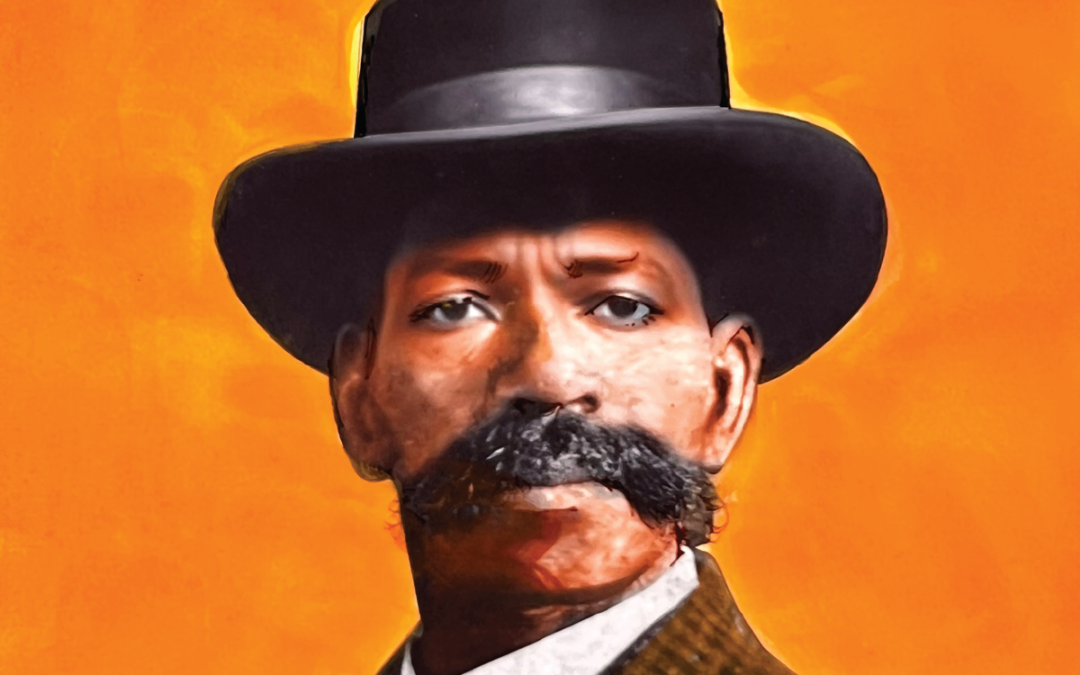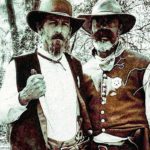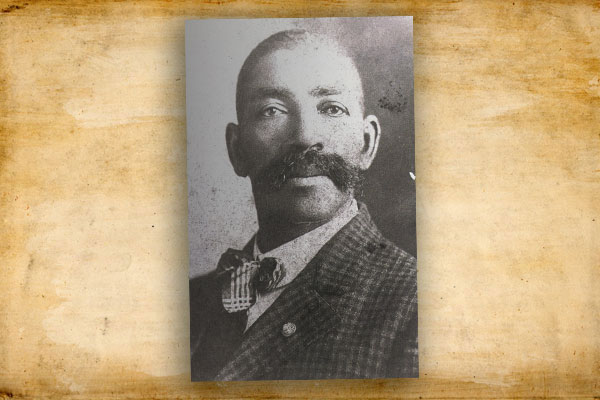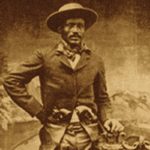Who was Bass Reeves?
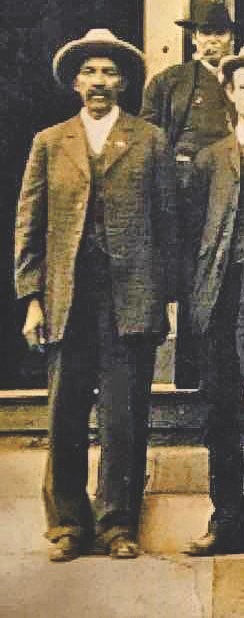
All Images Courtesy True West Archives Unless Otherwise Noted
Historian Art Burton has spent much of his life on the trail of the elusive lawman’s life. Reeves’s life from slave to deputy U.S. marshal serving the Western District of Arkansas in the Indian and Oklahoma territories in the last decades of the 19th century is extraordinary, but the truth about his life has not been published in detail until the last 30 years. Professor Burton’s determination to chronicle the life of Deputy Reeves is comparable to the famed lawman’s 32-year career in the U.S. Marshals. Since Burton’s Black, Red, and Deadly: Black and Indian Gunfighters of the Indian Territory, 1870-1907 (1991) and his definitive biography of the Western hero, Black Gun, Silver Star: The Life and Legend of Frontier Marshal Bass Reeves (2007) were published, Reeves’s life and career have slowly gained the notoriety and honor they deserve, including through novelization and Hollywood dramatization.

In 2021, True West’s editors worked closely with Burton on the magazine’s first in-depth cover story on the legendary life of Bass Reeves, including how Burton’s favorite lawman had become a darling of film and television. Three years later, with Lawmen: Bass Reeves, a highly rated and well-publicized primetime series streaming on Paramount+, we have asked Burton to recount the extraordinary life of Bass Reeves from his days as a slave to the most storied lawman to serve justice as a deputy U.S. marshal for Judge Isaac Parker.

Bass Reeves Timeline
1838 – Bass Reeves is born in Crawford County, Arkansas, as enslaved property of Arkansas politician/farmer William Steele Reeves.
1846 – Bass moves to frontier Texas with the William Steele Reeves family.
1850 – Bass is assigned to the son of William Reeves, George, as a body servant (valet). George is elected sheriff of Grayson County, Texas.

Bass Reeves’s owner at the onset of the Civil War. Courtesy DeGolyer Library, SMU
1855 – George Reeves is elected to the Texas House of Representatives for Grayson County.
1861 – George Reeves is made second in command of the Confederate 11th Texas Cavalry Regiment. Bass accompanies George as his body servant (valet). The 11th Cavalry Regiment fights in the Indian Territory.
1862 – Colonel George Reeves and the 11th Texas Cavalry Regiment fight at the Battle of Pea Ridge. Sometime after the battle, Bass and George have a fight over a card game, and Bass knocks George out and escapes into the Indian Territory.
1863 to 1865 – Bass Reeves serves with the Union Army in the Battles of Cabin Creek and Honey Springs, both Union victories. For the rest of the war, Reeves is involved in skirmishes and engagements as a Union irregular and scout in the Indian Territory.
1866 to 1870 – Bass Reeves is engaged as a scout/interpreter/guide for railroad surveyors in the Indian Territory.
1870 – Bass Reeves moves his family to Van Buren, Arkansas. Bass serves as a scout and guide for deputy U.S. Marshals of the federal court at Van Buren.
1875 – Federal court moved to Fort Smith in 1871. Bass is given a commission as deputy U.S. marshal under Judge Isaac C. Parker.

1880 – Reeves builds a new home inside the city limits of Van Buren. He is the first African American to build in the city; most Blacks live outside of town.
1883 – Reeves arrests a ranch foreman named Jim Webb for the murder of a Black preacher in the Chickasaw Nation. In making the arrest, Reeves must shoot and kill a Webb ally.
1884 – Reeves goes after Jim Webb, who was bailed out and didn’t appear for trial. Reeves and Webb have a gunfight in the Chickasaw Nation. Reeves kills Webb with a rifle shot at 500 yards at Bywaters Store. (Read the full story in “Classic Gunfights” on page 44.)
1884 – Reeves accidentally shoots his cook, William Leach, and kills him.
1885 – Bass requests the warrant for the arrest of Belle Starr for horse thief. Belle later turns herself in at Fort Smith, Arkansas.
1886 – In January, Reeves is arrested for the shooting of his camp cook, relieved of duty and incarcerated in the Fort Smith federal jail. In June, Reeves pays bail and is released.
1887 – Bass stands trial for the murder of Leach. A jury finds him not guilty, and he resumes his job as a deputy U.S. marshal.
1890 – Reeves arrests a Seminole outlaw, Greenleaf, who has murdered seven people: three Whites and four Indians. Greenleaf has been on the run for 17 years. Reeves attacks and burns down the cabin of fugitive Cherokee outlaw Ned Christie, but Ned escapes.
1893 – Reeves begins working for the Eastern District of Texas federal court in Paris. This court has jurisdiction over the Chickasaw and Choctaw Nations. Bass is stationed at Calvin, Choctaw Nation.
1896 – Reeves goes under cover as Jim Underwood in Houston to get a confession from a murder suspect. After spending three months with the suspect, Reeves receives a signed confession.
1896 – In March, Bass’s wife, Jennie, dies in Fort Smith, Arkansas.
1897 – Bass begins work for the Northern District of the Indian Territory, headquartered at Muskogee, Creek Nation. Reeves is stationed at Wetumka, Creek Nation.

1898 – Reeves is the lead investigator for the slayings of a Black man and White woman living common-law. The case is known as the “Wybark Tragedy.” Reeves makes several arrests, but there are no Grand Jury indictments.
1900 – Bass Reeves is remarried to a Cherokee Freedman named Winnie Sumter. Reeves moves to Muskogee and lives at 4th and Court Streets.

1903 – Reeves arrests his son, Bennie, for domestic murder in Muskogee. Bennie is convicted and sent to Leavenworth Federal Prison.
1906 – Bass escapes an assassination attempt on his life near Wybark, Creek Nation, on the Texas Road.
1907 – Reeves is involved in the largest gunfight in Muskogee history that involves Black anarchists called The United Socialist Club. Five of the outlaws are killed, two wounded and four surrendered. Bass killed one and wounded another.
1907 – Bass arrests the minister that baptized him for selling bootleg whiskey.
1908 – Bass Reeves becomes a member of the Muskogee Police Department at 68 years of age. He is given a beat in downtown Muskogee. Reeves brags, “There was never a crime on my beat!”
1912 – Bass Reeves dies of Bright’s disease and complications in Muskogee, Oklahoma, on January 12. He was 72 years old.
—Art T. Burton
Bass Reeves: The Greatest Deputy U.S. Marshal
Recently, David Kennedy, historical curator of the U.S. Marshals Museum in Fort Smith, Arkansas, commented about Bass Reeves: “…Most exemplary law enforcement officer the country has ever seen!”
Bass Reeves, the former enslaved African American from Arkansas and Texas reimagined himself and became one of the most legendary heroes in United States history. Reeves was not the first Black deputy for the Western District of Arkansas federal court, and there were many who followed him for that court, but he became the most famous and outstanding, regardless of race, in carrying out his duty to uphold the law.

The Western District of Arkansas had total jurisdiction over federal crimes in western Arkansas and all the Indian Territory, pre-statehood Oklahoma. The area was very diverse with American Indians, European Americans and African Americans. The Five Civilized Tribes had a large population of Black citizens due to the embrace of chattel slavery before and after their removal from the Southeast to the Indian Territory. After the war, these African Americans were known as Indian Freedmen. Many of the Black deputy U.S. marshals for the Fort Smith federal court were Indian Freedmen.
Reeves was hired in 1875, and the first U.S. marshal he worked under was Daniel Upham, former commander of the Arkansas State Militia that destroyed the Ku Klux Klan in Arkansas in the late 1860s. Reeves started after the arrival of Judge Isaac C. Parker, and worked for the Fort Smith court until 1893, when he transferred to the Eastern District of Texas Federal Court in Paris. Bass spent his last ten years of federal service working for the U.S. federal court at Muskogee, Creek Nation, Indian Territory. He is the only deputy on record who started with Judge Parker in 1875 and worked until Oklahoma statehood in November of 1907.

The Indian/Oklahoma Territories were the most dangerous area in the 19th and early 20th centuries for deputy U.S. marshals. Over 130 men lost their lives in those territories, according to the preeminent researcher of men killed in the line of duty for the U.S marshals service, Robert Ernst. Bass Reeves walked into the valley of death every day for 30 years and didn’t flinch. Reeves, as a Black man, had to navigate the racial landscape, attitudes and perceptions, of Whites, Blacks and Indians of the territories, which was not always an easy feat.

Courtesy nps.gov
In 1901, Reeves was interviewed by a newspaper, and he stated he had arrested at that time over 3,000 men and women who had broken federal laws. This was still six years before his retirement from federal service. Reeves worked primarily in the Indian and Oklahoma Territories, but while he was a deputy for the Eastern District of Texas federal court he went on assignment as far south as Houston, Texas. He was a master of disguise, regularly masquerading as a cowboy, preacher, farmer, tramp or outlaw to get near fugitives he was trying to capture. Reeves was very proud of his detective work. He was highly perceptive, had great observational skills and used deductive reasoning before the fictional character known as Sherlock Holmes did.
At Reeves’s death, many newspapers reported that he had killed 14 men in the line of duty. More than a few newspapers stated he had killed more than 20 men in the line of duty. Being that Reeves was ambidextrous with pistol and rifle, and an expert with either weapon, he would have to be considered one of the top gunfighters in Wild West history. I believe, unequivocally, that Bass Reeves was the greatest federal lawman of the Western frontier!
Who Was the Real Bass Reeves?
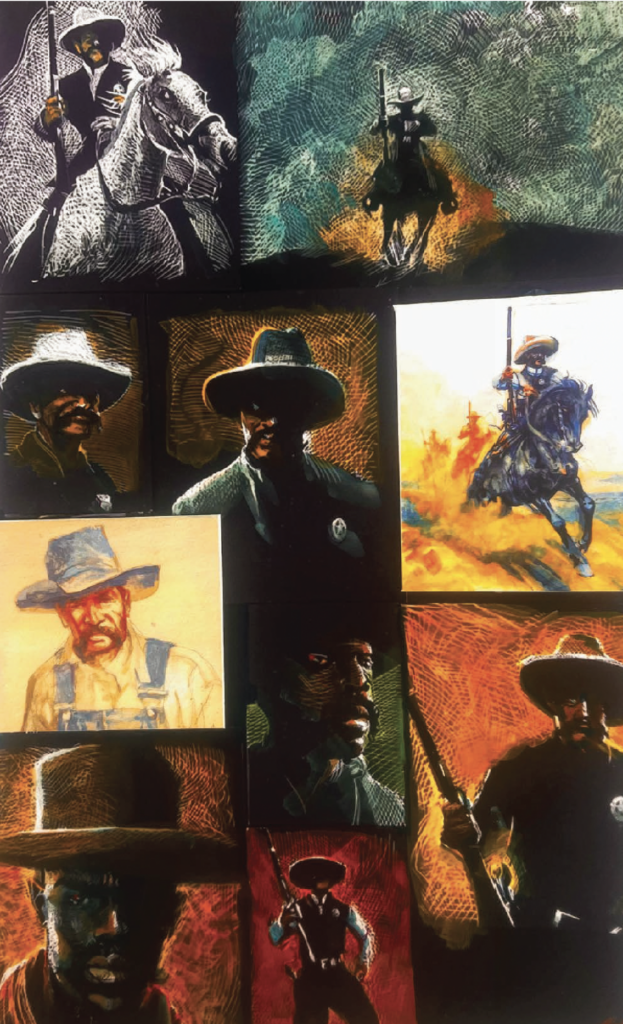
By all accounts Bass Reeves showed different looks throughout his long career, even posing as a farmer to hoodwink outlaws. And whether he rode white, gray or sorrel horses, he always stood tall in the saddle. Illustrations by Bob Boze Bell
Bass Reeves was a Texas gentleman and treated everyone with dignity and respect. Reeves was 6’2” and weighed 190 pounds. It was said he had near super-human strength, and he could whip any two men with his bare hands. Reeves was known to be gregarious, full of life, liked telling jokes and laughing. He was a master of disguise in his detective pursuits. Reeves mastered all weapons of combat and could shoot a pistol or rifle with either hand expertly. In a gunfight he would always sing softly prior to the engagement. He was always very focused on catching the felons he was chasing. Bass got to know a multitude of residents and settlers, a pioneer in community policing. He loved dogs and horses and kept a large dog to guard his camp and watch the prisoners. Reeves always rode large horses, favoring sorrels and grays. A true man of the West!
—A.B.
The Discovery of Bass Reeves’s Attempted Assassination Site
Deputy U.S. Marshal Jeremy Hammons of the Eastern District of Arkansas office in Little Rock, Arkansas, and Mike Higgs, assistant curator for the Secretary of State Office at the Arkansas State Capitol, located the trestle that Bass Reeves rode under in November of 1906 when he was almost assassinated near Wybark, Creek Nation, Indian Territory. Reeves was fired on in the darkness as he drove his buggy under the trestle and returned fire but didn’t hit the culprit.


Higgs took the initiative and started researching old railroad maps of the Missouri, Kansas and Texas Railroad. He spoke to the curator of history for the Union Pacific Railroad that currently owns the tracks of the fallen flag M.K.&T. railroad line today. Higgs was able to ascertain that the trestle was on a spur line that ran from Muskogee to Tulsa in the Creek Nation, now Oklahoma. The trestle was built in 1902, four years before the Reeves incident. It was near a water spring and crossed over the old Texas Road.
Deputy Hammons was able to take the information and travel from Little Rock and find the exact location north of Muskogee. The Union Pacific Railroad still uses the spur track. The location is now on private property, but Hammons was able to get permission for the search, which turned out successful—a good piece of detective work by Higgs and Hammons.
—A.B.
Bass Reeves and the Media
The biggest recent news for Bass Reeves in popular media was the release in 2023 of Lawmen: Bass Reeves, an eight-part series produced by Taylor Sheridan and David Oyelowo, who also portrayed Reeves in the production on Paramount+. In 2021, Bass Reeves was portrayed in the BBC production of Around the World in 80 Days, shown on PBS in the United States. Reeves was played by British actor Gary Beadle. Reeves was also portrayed in the INSP Western Cable Channel series Wild West Chronicles in 2021 and 2023.

On the literary scene, my book, Black Gun, Silver Star: The Life and Legend of Frontier Marshal Bass Reeves came out with an enlarged revised edition in September of 2022. This book has not been optioned for a movie or a television series yet. TCU Literary Professor Sidney Thompson’s fictional trilogy on Bass Reeves was optioned for the Lawmen: Bass Reeves series. Thompson’s books are Follow the Angels, Follow the Doves, 2020; Hell on The Border, 2021; and The Forsaken and The Dead, 2023. The first two books were used for the miniseries. Other noted fiction books on Bass Reeves include The Legend of Bass Reeves: Being the True and Fictional Account of the Most Valiant Marshal in the West by Gary Paulson and Bad News for Outlaws by Vaunda Nelson in 2009. A recent fiction book, Bass Reeves Versus… by Ben L. Jones, published in 2023. These books were written for young readers. Two fiction books were written about Bass Reeves arresting his son: Legacy of a Lawman: A Western Story by Johnny D. Boggs (2013) and A Bass Reeves Adventure: Give Me The Warrant by S.C. Sherman (2023).

Courtesy Amazon
The literary rights of my first book Black, Red, and Deadly: Black and Indian Gunfighters of the Indian Territory, 1870-1907, with the largest chapter on Bass Reeves, was purchased by Morgan Freeman and his company Revelations Entertainment Inc. and has currently not found a home as a movie or a streamer for a television series. In 2015, two docudramas were made about Bass Reeves for cable television, the first was from FOX Television produced by Bill O’Reilly for his Legends and Lies Western series titled “Bass Reeves: The Real Lone Ranger.” Bass Reeves was portrayed by the actor D.L. Hopkins, with onscreen remarks by me. The second docudrama was from the Discovery Channel for their series Gunslingers, second season, titled “Bass Reeves: The Real Lone Ranger.” Bass was portrayed by actor Joseph Curtis Callender with onscreen remarks by True West magazine Executive Editor Bob Boze Bell and me.

Courtesy Avondale Pictures
Earlier in television, Bass Reeves was intelligently portrayed by actor Colman Domingo and Deputy U.S. Marshal Grant Johnson in the NBC series Timeless in the fictional episode titled “The Murder of Jesse James” in 2017. In January 2020, there was an independent small budget movie released titled Hell on the Border filmed in Alabama, which starred David Gyasi as Bass Reeves as the lead character. The movie was not historically accurate and had a weak plot.
Corsicana, another independent movie released in 2021 was shot in Texas and was directed by and stars Isaiah Washington as Bass Reeves based on a fictional storyline.

Netflix developed a fictional Black Western movie produced by Jay-Z, a 2021 release titled The Harder They Fall which used the names of various African American characters of the real Western frontier. Some of the historic names portrayed in the movie were Stagecoach Mary, Nat Love, Rufus Buck, Jim Beckwourth and Cherokee Bill. The noted British film actor Delroy Lindo portrayed lawman Bass Reeves. This movie was very popular on Netflix, and they have been greenlit for a sequel.

In documentary film, the French public television network, ARTE, produced a documentary titled Black Far West, also known as The Black West: A Counter History of the Wild West, which featured Bass Reeves; it was released in 2023. There is also a new documentary titled In Search of Bass Reeves, released in 2024 by Knox Robinson Films. Both films will be available to view on Amazon Prime Channel.

How overlooked was Bass Reeves in mainstream popular culture until Art T. Burton began publishing on Reeves in 1991? From 1953 to 1979, Reeves was never mentioned in True West magazine.
And what about in mainstream television, where the Western was king through the 1950s and 1960s? The first Black actor to appear in a Western was Raymond St. Jacques as cowboy Simon Blake in Rawhide’s final season on CBS in 1965, and the first regular role for a Black actor in a Western series was Otis Young in ABC’s The Outcasts in 1968-69.
In December 1991, Art Burton brought Bass Reeves’s life story to the pages of TW for the first time with the cover headline story, “Bass Reeves: Deputy U.S. Marshal.”

Under the leadership of Executive Editor Bob Boze Bell, Art Burton’s research on Bass Reeves began to be shared in TW, but it wasn’t until February-March 2021 that Reeves was featured on our still-controversial mash-up cover of Bass Reeves as the Lone Ranger. We are grateful to Art Burton for his patience and persistence with TW, and we plan to work with the Chicago-based historian in bringing to light many more important minority men and women who helped build the West in the 19th and early 20th centuries.
—Stuart Rosebrook

